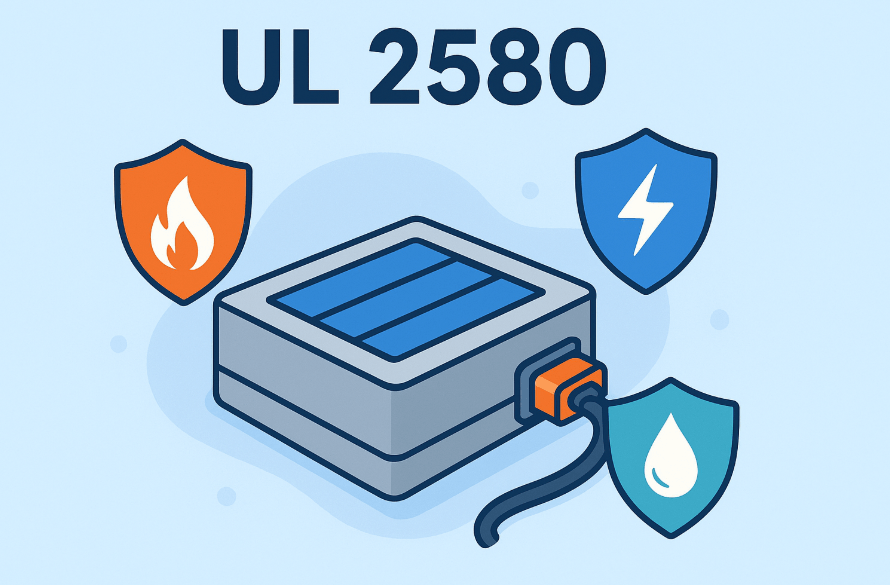UL 2580 Certification: A Guide to EV Battery Safety
Electric vehicles are driving the future of transportation. As adoption grows, battery safety has become a critical focus for manufacturers and regulators. To ensure reliability, UL 2580 certification was introduced as a dedicated safety standard for electric vehicle batteries.
This blog explains what UL 2580 covers, why it’s important, and how it differs from other UL certifications.
What is UL 2580?
UL 2580 is a safety standard for lithium-ion battery packs and modules used in electric vehicles. Developed by Underwriters Laboratories, it focuses on testing how batteries perform under electrical, mechanical, and environmental stresses.
Unlike standards aimed at small devices or stationary storage, UL 2580 addresses the unique demands of automotive applications, where batteries face high loads, vibrations, and varied climate conditions.

Scope of the UL 2580 Standard
The requirements apply to complete battery packs and modules used in passenger cars, buses, and commercial EVs. The goal is to minimize risks like fire, leakage, or explosion by verifying:
- Electrical protection (overcharge, short circuit, insulation resistance)
- Mechanical resilience (impact, crush, vibration)
- Environmental durability (temperature extremes, water exposure, corrosion)
These evaluations simulate real-world driving scenarios, from high-speed crashes to operation in extreme weather.
Benefits of Compliance
1. Safety Assurance
Certification confirms that EV batteries can withstand demanding conditions without compromising driver or passenger safety.
2. Market Access
Many global regions expect compliance with UL2580 or equivalent standards before EVs can be sold.
3. Consumer Confidence
When automakers highlight UL-certified batteries, it reassures buyers that the technology is tested and reliable.
4. Brand Advantage
Certification demonstrates a manufacturer’s commitment to high-quality and safe energy storage solutions.
UL 2580 vs. Other Certifications
Battery standards vary depending on application. Here’s how UL 2580 compares:
| Standard | Applies To | Main Focus |
|---|---|---|
| UL 1642 | Individual cells | Cell-level safety tests |
| UL 2054 | Household/portable devices | Consumer electronics batteries |
| UL 2271 | Light electric vehicles | E-bikes, scooters |
| UL 2580 | EV battery packs & modules | Vehicle-level battery safety |
| UL 1973 | Stationary & motive use | Energy storage & industrial vehicles |
This comparison highlights UL2580 as the benchmark for road-going electric vehicles.
Looking Ahead
As battery technologies evolve—such as solid-state and advanced chemistries—standards like UL2580 will also adapt. This ensures future EVs continue to meet stringent safety requirements while supporting global electrification goals.
Conclusion
UL 2580 plays a key role in making electric vehicles safer and more reliable. By verifying battery pack safety under extreme electrical, mechanical, and environmental stresses, it protects consumers and strengthens trust in EV technology.
For manufacturers, certification isn’t just about compliance—it’s about staying competitive in a fast-growing market.
FAQs
1. What is tested under UL 2580?
Electrical, mechanical, and environmental safety of EV battery packs.
2. Is it mandatory?
In many regions, yes, or an equivalent standard is required for market approval.
3. How does it differ from UL 1973?
UL 2580 applies to road vehicles, while UL 1973 is for stationary or motive applications.
4. Who needs it?
Automakers, EV battery pack suppliers, and system integrators.
5. Does it apply to solid-state batteries?
Yes—future updates ensure new technologies remain covered.


